|
|
|
Sort Order |
|
|
|
Items / Page
|
|
|
|
|
|
|
| Srl | Item |
| 1 |
ID:
124429
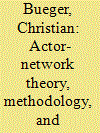

|
|
|
|
|
| Publication |
2013.
|
| Summary/Abstract |
Since its initial formulation in science and technology studies, actor-network theory (ANT) has spread like wildfire throughout the social sciences. Wildfires are fueled by dry and flammable vegetation as well as hot, gusting winds. ANT finds flammable vegetation among those frustrated with many of the conventions, dualisms, and dilemmas of the traditional social sciences. ANT promises to liberate scholars from strict dualisms such as the nature/society divide and the agency/structure dilemma. It claims to open up a reflexive discourse on what constitutes the practice of science. ANT's avant-garde spirit further fuels the fire. Others reject ANT. They (rightfully) lament the often-awkward terminology of ANT, its lack of appropriately defined models and concepts, its literary style of presentation, as well as the radical rhetoric that often comes along with it. For many, the question of what actually constitutes ANT remains mysterious, and it is often unclear whether it is more than a "new materialist" argument for taking objects, things, and technology seriously.
|
|
|
|
|
|
|
|
|
|
|
|
|
|
|
|
| 2 |
ID:
148313
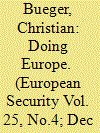

|
|
|
|
|
| Summary/Abstract |
The practice turn provides new avenues for core questions of international relations and European Studies. This article draws on a practice theoretical account to shed new light on the constitution of agency in global politics. An understanding of agency as achievement that requires significant practical work and the participation in international fields of practice is developed. Drawing on the case of the field of counter-piracy practice and the European Union’s (EU’s) work to counter piracy off the coast of Somalia, it is shown how the EU achieved the position as a core actor in the field. A detailed discussion of the EU’s work in interrupting and knowing piracy, in building capacity, and in governing piracy is provided.
|
|
|
|
|
|
|
|
|
|
|
|
|
|
|
|
| 3 |
ID:
140274
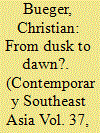

|
|
|
|
|
| Summary/Abstract |
Information Sharing and Maritime Domain Awareness (MDA) are at the heart of the contemporary maritime security agenda. The goal of MDA is to develop shared understandings of developments and threats at sea. It is one of the preconditions for coordination and cooperation between diverse maritime security agencies and has often been understood as “key enabler”. MDA is a major technical challenge in terms of collecting and fusing data and developing expert systems for the detection of anomalies. It is also a social, political and legal challenge. This study focuses on the latter. It asks how MDA can be organized and how the socio-political challenges can be addressed. The organization of MDA in Southeast Asia is discussed in-depth, with a focus on three major centres that are the backbone of the regional MDA structure. Although far from perfect, this regional system has become a role model for organizing MDA in other parts of the world. This article explores the functions that the three centres perform in the governance of maritime security in the region. I argue that each of the MDA centres has different strengths, and that their work should be seen as complimentary in an overarching system. The strength of the overall system is in enabling trust and being flexible and adaptable to the changing situation at sea. The conclusion outlines what lessons the system holds for the organization of MDA in other regions with a focus on the Western Indian Ocean.
|
|
|
|
|
|
|
|
|
|
|
|
|
|
|
|
| 4 |
ID:
160248
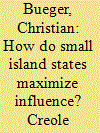

|
|
|
|
|
| Summary/Abstract |
A lack of capabilities is most often taken to imply a lack of influence. The foreign policy of the Seychelles provides a surprising case of successful small state diplomacy that counters this claim. With a population of less than 100,000 and a diplomatic service of 100 staff, Seychelles is recognized as a broker in international organizations and as an agenda setter in ocean governance. This article explores this success in four steps. First, we unpack why the current diplomatic success of Seychelles is a surprise. Second, drawing on literature on small state diplomacy, we identify three sources of small state influence: capability and location, political culture and institutional design, and political strategy. Third, we analyze recent Seychellois diplomacy in light of the four factors as well as the limitations of Creole small state diplomacy. We conclude by discussing what other small states may learn from the Seychelles.
|
|
|
|
|
|
|
|
|
|
|
|
|
|
|
|
| 5 |
ID:
181758
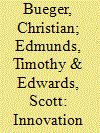

|
|
|
|
|
| Summary/Abstract |
2021 is a key moment of opportunity for UK maritime security. The publication of the government’s Integrated Review in March is being followed by a systematic ‘refresh’ of the UK’s 2014 National Strategy for Maritime Security. In this article, Christian Bueger, Timothy Edmunds and Scott Edwards examine the role and significance of this strategy refresh, consider key priority issues for enhancing maritime security, and reflect on the challenges and opportunities that policymakers will face turning strategy into action. They conclude by arguing that getting maritime security right will be critical to delivering on the UK’s ambitions in security and foreign policy more widely.
|
|
|
|
|
|
|
|
|
|
|
|
|
|
|
|
| 6 |
ID:
173915
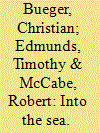

|
|
|
|
|
| Summary/Abstract |
Maritime security capacity-building is a growing field of international activity. It is an area that requires further study, as a field in its own right, but also as an archetype to develop insights for capacity-building and security sector reform in other arenas. This article is one of the first to analyse this field of activity. Our empirical focus is on the Western Indian Ocean (WIO) region. Here, international actors have launched multiple capacity-building projects, initially in response to Somali piracy. We document the significance, extent and variety of capacity-building activities in this region and examine the ways in which capacity-building at sea has incorporated innovative characteristics that develop and expand the capacity-building agenda as traditionally understood. Our conclusion highlights the need to pay more attention to the maritime domain in international security and development studies and considers ways in which the maritime capacity-building experience may offer important lessons for other fields of international policy.
|
|
|
|
|
|
|
|
|
|
|
|
|
|
|
|
| 7 |
ID:
137610
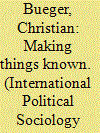

|
|
|
|
|
| Summary/Abstract |
How are international phenomena rendered knowable? By which means and practical devices is international knowledge generated? In this article, I draw on the case of contemporary maritime piracy to introduce a research framework that allows these questions to be addressed. Arguing that the practices of international knowledge generation are poorly understood, I show how concepts from science and technology studies provide the tools to study these practices empirically. Relying on the practice theory of Karin Knorr Cetina, I introduce the concepts of epistemic infrastructures, epistemic practice, and laboratories and demonstrate how they facilitate interesting insights on knowledge generation. I investigate three “archetypes” of epistemic practices in detail and show how these generate knowledge about piracy for the United Nations. The three archetypes are the quantification practices of the International Maritime Organization, the interpretation work of a monitoring group and the network of a special adviser. The article introduces an innovative agenda for studying knowledge generation in international relations by focusing on the practical epistemic infrastructures, which maintain knowledge about international phenomena.
|
|
|
|
|
|
|
|
|
|
|
|
|
|
|
|
| 8 |
ID:
168416
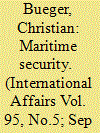

|
|
|
|
|
| Summary/Abstract |
In this introduction to a special section of the September 2019 issue of International Affairs, we revisit the main themes and arguments of our article ‘Beyond seablindness: a new agenda for maritime security studies’, published in this journal in November 2017. We reiterate our call for more scholarly attention to be paid to the maritime environment in international relations and security studies. We argue that the contemporary maritime security agenda should be understood as an interlinked set of challenges of growing global, regional and national significance, and comprising issues of national, environmental, economic and human security. We suggest that maritime security is characterized by four main characteristics, including its interconnected nature, its transnationality, its liminality—in the sense of implicating both land and sea—and its national and institutional cross-jurisdictionality. Each of the five articles in the special section explores aspects of the contemporary maritime security agenda, including themes of geopolitics, international law, interconnectivity, maritime security governance and the changing spatial order at sea.
|
|
|
|
|
|
|
|
|
|
|
|
|
|
|
|
| 9 |
ID:
185520
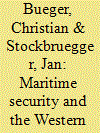

|
|
|
|
|
| Summary/Abstract |
Ten years after the last large scale piracy attacks in the Western Indian Ocean, other maritime crimes such as illicit fishing and maritime smuggling have emerged. The spill over of conflicts in Yemen and Mozambique and maritime grey-zone activities have also become major maritime security issues. Yet, perhaps the most worrying – though largely underappreciated – trend is the surge of naval activity and strategic competition in the region. This is a major dilemma for the region: The region relies on external military actors to protect vital shipping lanes, but the presence of these actors also risks importing geopolitical tensions that could undermine regional maritime stability. How can the region address these maritime insecurities and the evolving militarisation dilemma? We investigate the regional maritime security architecture to identify institutions that can help the region manage the militarisation dilemma. We argue that only the Shared Awareness and Deconfliction (SHADE) mechanism and the Contact Group on Piracy off the Coast of Somalia (CGPCS) can help mitigate geopolitical competition in the region. Preparing these mechanisms to deal with the militarisation dilemma will be vital for the long-term prosperity of the Western India Ocean.
|
|
|
|
|
|
|
|
|
|
|
|
|
|
|
|
| 10 |
ID:
134258
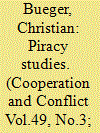

|
|
|
|
|
| Summary/Abstract |
In the last decade maritime piracy has become recognized as a pressing global problem. Together with the problem the new inter-disciplinary project of piracy studies has emerged. In this article I review the state of knowledge and the character of piracy studies. I present two arguments. Firstly, I review recent contributions and suggest that piracy studies is organized in three pillars. The first pillar studies the phenomenon of piratical practice and organization, the second the various organizational responses to it, and the third historicizes and theorizes piracy and the response to it. For each of these pillars I outline future challenges. Secondly, I argue to understand piracy studies, following John Dewey as a ‘community of inquiry’, that is, a community of researchers interested in translating violence and crime at sea into distinct problems that can be mastered. Although researchers rely on different scientific methods as well as divergent problematizations, piracy studies is an inter-disciplinary project that combines abstract and critical stances with immediate practical policy relevance. Far from being a niche project, piracy studies is representative of an innovative mode of knowledge production. Hence, there are larger lessons to be drawn from piracy studies, namely how knowledge generation can be organized to address a contemporary problem.
|
|
|
|
|
|
|
|
|
|
|
|
|
|
|
|
| 11 |
ID:
148976
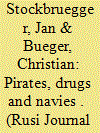

|
|
|
|
|
| Summary/Abstract |
International operations against piracy in the Western Indian Ocean are due to wind down. Some major external navies will probably remain, but the region’s states will have to adjust to their new role in managing the challenging security environment. In this article, Christian Bueger and Jan Stockbruegger examine the options for cooperation in this volatile region.
|
|
|
|
|
|
|
|
|
|
|
|
|
|
|
|
| 12 |
ID:
106771
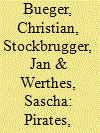

|
|
|
|
|
| Publication |
2011.
|
| Summary/Abstract |
The dominant approach to counter-piracy strategy off Somalia is astonishingly narrow-minded. Deterrence, surveillance and military operations do not provide sustainable or efficient solutions; better strategic alternatives must draw on the lessons of 21st-century peace operations. This perspective leads to an understanding of counterpiracy as a problem of peacebuilding. This allows restructuring and reframing of the problem to permit a much wider repertoire of policy solutions than is currently conceived. This repertoire may include development and security assistance programmes as well as state-building programmes. The approach also permits integration of lessons learned in the frame of international peacebuilding operations, including avoiding technocratic solutions, focusing on power constellations, integrating local knowledge and incrementalism. If the international community wishes to take piracy seriously and respond to its complexities, it would be well advised to adopt a policy in which such alternatives are considered.
|
|
|
|
|
|
|
|
|
|
|
|
|
|
|
|
| 13 |
ID:
141845
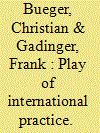

|
|
|
|
|
| Summary/Abstract |
The core claims of the practice turn in International Relations (IR) remain ambiguous. What promises does international practice theory hold for the field? How does the kind of theorizing it produces differ from existing perspectives? What kind of research agenda does it produce? This article addresses these questions. Drawing on the work of Andreas Reckwitz, we show that practice approaches entail a distinctive view on the drivers of social relations. Practice theories argue against individualistic-interest and norm-based actor models. They situate knowledge in practice rather than “mental frames” or “discourse.” Practice approaches focus on how groups perform their practical activities in world politics to renew and reproduce social order. They therefore overcome familiar dualisms—agents and structures, subjects and objects, and ideational and material—that plague IR theory. Practice theories are a heterogeneous family, but, as we argue, share a range of core commitments. Realizing the promise of the practice turn requires considering the full spectrum of its approaches. However, the field primarily draws on trajectories in international practice theory that emphasize reproduction and hierarchies. It should pay greater attention to practice approaches rooted in pragmatism and that emphasize contingency and change. We conclude with an outline of core challenges that the future agenda of international practice theory must tackle.
|
|
|
|
|
|
|
|
|
|
|
|
|
|
|
|
| 14 |
ID:
126054
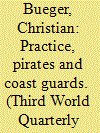

|
|
|
|
|
| Publication |
2013.
|
| Summary/Abstract |
In this article I develop a practice-theoretical account to provide the first systematic investigation of the justification of Somali piracy. Arguing for an understanding of piracy as a 'community of practice', I show how this community is organised by a 'grand narrative' that projects piracy as a quasi-state practice of the protection of sovereignty against foreign intruders. Paying attention to narrative provides an explanation for the persistence of piracy and assists us in understanding the phenomenon. Relying on publicly available interviews with pirates, I deconstruct this grand narrative and detail the different functions of the narrative in the light of situations in which it is told. The article develops an alternative perspective on piracy based on the study of practice, narrative and situation that provides new avenues for the study of clandestine, illicit or violent practices.
|
|
|
|
|
|
|
|
|
|
|
|
|
|
|
|
| 15 |
ID:
178873
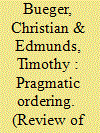

|
|
|
|
|
| Summary/Abstract |
The question of when and how international orders change remains a pertinent issue of International Relations theory. This article develops the model of pragmatic ordering to conceptualise change. The model of pragmatic ordering synthesises recent theoretical arguments for a focus on ordering advanced in-practice theory, pragmatist philosophy, and related approaches. It also integrates evidence from recent global governance research. We propose a five-stage model. According to the model, once a new problem emerges (problematisation), informality allows for experimenting with new practices and developing new knowledge (informalisation and experimentation). Once these experimental practices become codified, and survive contestation, they increasingly settle (codification) and are spread through learning and translation processes (consolidation). We draw on the rise of the maritime security agenda as a paradigmatic case and examine developments in the Western Indian Ocean region to illustrate each of these stages. The article draws attention to the substantial reorganisation of maritime space occurring over the past decade and offers an innovative approach for the study of orders and change.
|
|
|
|
|
|
|
|
|
|
|
|
|
|
|
|
| 16 |
ID:
179281
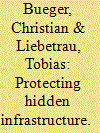

|
|
|
|
|
| Summary/Abstract |
Undersea communication cables are the core critical infrastructure of the digital age. 99% of all transoceanic digital communication—financial transactions, emails, or voice messaging—is transported through undersea fiber-optic cables. The global submarine cable network is a critical infrastructure that does not receive the analytical attention it deserves. We argue that cable security is a core dimension of current and future international security governance. We present the first systematic survey of the academic discourses that investigate the politics, governance, and protection of submarine data cables. Three rather narrow literatures study the cables (1) as under threat from hybrid warfare and terrorism, or treat the cable network narrowly as a (2) technical or (3) regulatory problem. We demonstrate the need for broadening out the research agenda and addressing key questions of security governance and geopolitics of this increasingly critical infrastructure.
|
|
|
|
|
|
|
|
|
|
|
|
|
|
|
|
|
|
|
|
|